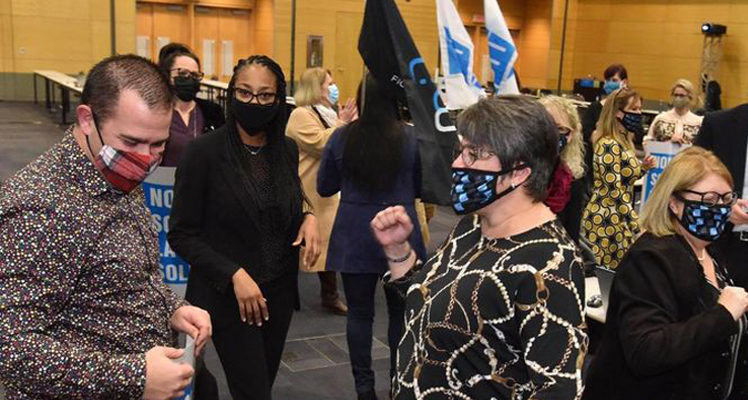
Healthcare professionals’ negotiations: the FIQ and FIQP delegates adopted a new tentative agreement on the sectoral matters by a strong majority
Meeting in a virtual Provincial Council on Tuesday, the Fédération interprofessionnelle de la santé du Québec–FIQ and FIQ | Secteur privé delegates adopted the new tentative agreement reached in the last few hours with the government on the sectoral matters at 82%. “This is an agreement that will significantly improve the Québec nurses, licensed practical nurses, respiratory therapists and clinical perfusionists’ working conditions. The gains obtained are significant for the healthcare professionals, as they will profoundly change the destructive management culture of recent years that has greatly contributed to the deterioration of the working conditions. Moreover, management by mobility and flexibility will be a thing of the past and now the focus will be on stability. Not only will our members’ quality of professional and personal life improve, but Québec patients will also have greatly improved quality of their care”, stated Nancy Bédard, President of the FIQ.
Major gains
Remember that at the heart of the healthcare professionals’ demands are work overload, healthcare professional-to-patient ratios, especially in CHSLDs, and making full-time positions more attractive. “These three major issues are intimately linked with each other and should be considered as inseparable by the government. In the end, the gains we obtained will guarantee healthcare professionals that they will work with a complete work team and in a stable position, on both their centre of activities and shift. They will be able to know their schedule in advance and have time off. They won’t be taken hostage by mandatory overtime. In short, be able to practice their profession in a health network where work-family-personal life balance will truly be possible”, explained in one voice Roberto Bomba and Jérôme Rousseau, joint political officers for the negotiations.
Among the gains obtained are:
- Targets reducing healthcare professional-to-patient ratios in public and private subsidized CHSLDs and the addition of 1,000 full-time equivalent positions;
- A letter of understanding with the objective of reducing the use of overtime and independent labour (IL);
- A government commitment to review the directive on the management framework governing the use of IL;
- The voluntary upgrading of a healthcare professional’s part-time position to full time on her shift and centre of activities;
- The addition of 500 full-time equivalent positions with priority in medicine-surgery centres of activities;
- A new attraction-retention premium for employee incumbents of a full-time position on the evening or night shift and on rotation that can be a 4% increase;
- The weekend premium for healthcare professionals with a full-time position will go from 4% to 8%;
- The possibility for a healthcare professional working full-time evenings to have a 9/14 schedule for better work-family-personal life balance;
- The reduction of job insecurity for healthcare professionals, as they will have access to part-time positions with 7 shifts per 15-day period;
- Expansion of the specific critical care premium to obstetrical care units (mother-child);
- A workweek of 37.5 hours for clinical perfusionists, respiratory therapists who work in a 24/7 centre of activities or on two different continuous shifts, and for nurses, licensed practical nurses and respiratory therapists who work in a CLSC and northern clinic;
- An increase in the number of paid hours for the specialty nurse practitioner and specialty nurse practitioner candidate to 40 hours a week;
- Automatic reclassification of the employee with a Bachelor of Nursing degree to the nurse clinician job title.
These are major gains for the FIQ and FIQP and will provide an important framework for managers’ work and the use of independent labour (IL), whose personnel are not subject to the same rules and working conditions as those in the public network. “The necessary boost that the health network and healthcare professionals so badly needed is here at last. Obviously, this tentative agreement on the sectoral matters will not resolve all the healthcare professionals’ problems, but we are convinced that the effects will be beneficial and sustainable over time for our members, as well as for the patients in Québec”, concluded Ms. Bédard.
What’s next…
Remember that this agreement does not affect the intersectoral matters such as salary, retirement, parental rights and regional disparities. The APTS-FIQ Alliance is continuing the negotiations on these matters. Holding a referendum vote will be determined later at a future Provincial Council on negotiations following an intersectoral tentative agreement. The members will vote on a global tentative agreement.